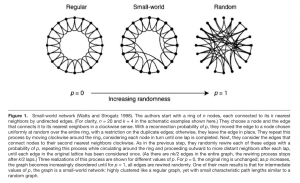Loss of small-world connectivity in Alzheimer’s Disease
Alzheimer’s disease is a neurodegenerative disease that manifests itself as impaired memory and cognitive dysfunction. Using a network theoretical approach to modelling the brain, Alzheimer’s disease is thought to cause disruption of large-scale connections between brain areas. This decrease in connections between brain areas is thought to underlie the loss of higher cognitive function seen in patients in the later stages of the disease.
A simple model for the connectivity of the brain is a small-world network as seen below. Different brain areas are shown as individual nodes with edges connecting them to their neighbours and to a lesser degree nodes located further away on the circle. This has the advantage of allowing for modelling of integrated and segregated information processing.
The article below attempts to elucidate the dynamics of Alzheimer’s disease’s impact on the integrity of networks in the brain. This may lead to a better understanding of how cognitive function is impaired and pave the way for better diagnostics and monitoring of the disease.
He, Y., Chen, Z., Gong, G. & Evans, A.C. Neuronal Networks in Alzheimer’s Disease. The Neuroscientist 333-350 (2009).

